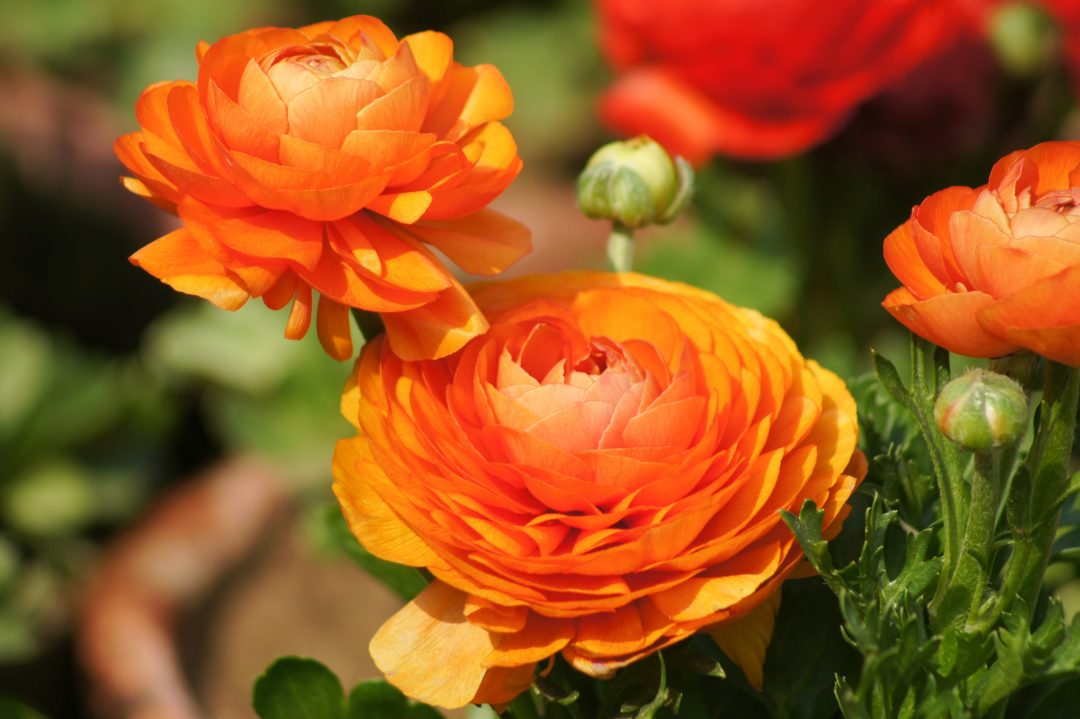This romantic flower, also known as a buttercup or Persian buttercup, is adorned with delicate petals tightly packed in each blossom. Straight out of a fairytale, the ranunculus is a popular choice for wedding ceremonies. Bride’s have plenty of colors to choose from like, ruby reds, yellows, bright oranges, pink, violet, white, and many more soft pastel palettes.
Cultivars of Ranunculus asiaticus species continue to be one of the best selling cut flowers, especially hybrid strains like ‘Aviv’, ‘Victoria’, ‘Telecote’ and ‘Tomer’. These hybrid species grow larger, bi-color blooms similar to peonies. These generally produce large, peony-like blooms without such a restricted growth season.
Early Origins of Ranunculus
Ranunculus, although native to Southwest Asia, eventually made their way to Europe in the 16th century, reportedly along with anemone and tulips. This was parallel to the infamous Dutch “Tulip Fever” where the demand was so high for tulip bulbs that they altered the economic market. However, historians have recently debunked this myth, but agree these flowers were introduced during the reign of Queen Elizabeth I.
Ranunculus flower’s Latin meaning “little frog”, most likely deriving from their natural habitat of lake beds and streams where little frogs frequented. The buttercup name origin is disputed, but it may come from its natural pale yellow hue resembling butter. It could have also developed alongside a childhood game of picking ranunculus and holding it to their chins, and if their chins glowed yellow, they liked butter! But who doesn’t?
This schoolyard phenomenon isn’t just a trick of the light. Ranunculus petals glow due to their mirror flat cells that reflect UV light. Physicists have even found buttercups reflect light better than most flowers, making it perfect for the glowing illusion. This adaptation helps attract pollinators like bees by looking vibrantly yellow and attractive from any aerial angle.
Ranunculus Legends & Myths
Varied Native American tribes referred to ranunculus as coyote eyes. They shared a story about how the mythological coyote would toss his eyes up in the air and catch them over and over again for fun. Then one day, when the coyote tossed his eyes up, an eagle stole them in its talons and flew away with the coyote’s eyes. The coyote quickly grabbed two ranunculus flowers from the field to replace his eyes.
Across the pond the Persians had another ranunculus origin story. According to Persian legend, ranunculus first came to be after an esteemed Persian prince fell in love with an enchanting forest nymph. He would sing all day and night, which some versions of the legend say the nymphs turned him into a ranunculus to stop the incessant singing. In the most popular version. she tragically declined the prince’s advances, which lethally broke his heart. The first ranunculus grew from the soil where he laid to rest.
What Does Ranunculus Symbolize?
Victorian era romantics would swap ranunculus’ to convey charm and attractiveness. It would have been an ideal bouquet to send during the early stages of courtship.
It’s also associated with childhood and playfulness, which coincides with its reputation as a school yard game. The lily also symbolizes innocence, but ranunculus embodies a more cheerful, happy innocence than a solemn lily.
Ranunculus Meaning and Color Symbolism
According to HBloom.com:
- Red Ranunculus
A deep red embodies the flirty aspects of passion and romance. This is a favorite among wedding planners trying to strike a balance between creating a fun, light-hearted day and reverence for the matrimonial commitment.
- Orange Ranunculus
Orange buttercups symbolize joy, positivity, and happiness. Cheer up someone’s day with bright orange petals packed neatly and tightly in each blossom. It’s almost impossible to frown looking at an orange bouquet of ranunculus’.
- Pink Ranunculus
Pink petals show flirtation and charm. Think puppy love or even new friendship! It’s a gorgeous shade to usher in the spring season or celebrate holidays like Easter. Exact ranunculus meaning varies, but pink buttercups could also be a great Mother’s Day gift.
- Yellow Ranunculus
Yellow is as cheery as it gets, representing joy and friendship. Its message is similar to orange ranunculus, with a little more emphasis on happiness and approaching life with a “glass half full” mindset.
- White Ranunculus
A white ranunculus is a wedding ceremony and reception staple as it compliments any color scheme and represents grace, decorum, and fresh/pure love. It’s a charming addition to any arrangement adding a dash of personality without overpowering the focal point.
- Purple Ranunculus
Ranunculus meaning beauty, royalty, and elegance will be purple petaled. Spark your creativity with bright purple Persian buttercups.
Ranunculus Flower Fun Facts
- All species of ranunculus are poisonous to animals and humans, causing rashes, burning, and blisters when crushed up or ingested.
- Their paper thin petals are often compared to crepe paper and resemble a sweet slice of crepe cake.
- Native Americans utilized the medicinal properties of ranunculus by grounding dried petals into a poultice to treat warts and sore muscles.
- The prevalence of invasive species and habitat destruction has landed some ranunculus species on the wild endangered flora list.
- The vast majority of ranunculus species are unscented, making it a great choice for sensitive noses.
- Ranunculus are often confused with peonies, but we wrote a guide to spotting the difference between ranunculus and peonies.
Ranunculus are an overall adorably unique flower that will boost your mood with its whimsical nature. They last up to seven days in a vase with little to no attention, but if you want to watch them blossom, ranunculus are a great choice for spring gardens. Express your platonic or romantic love with ease by ordering ranunculus bouquets online.
Shop All



